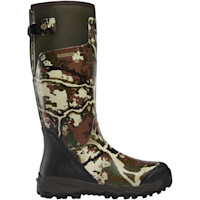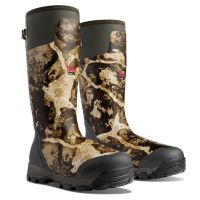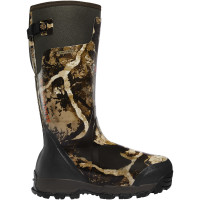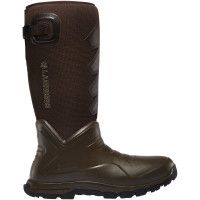
Rubber boots might be the most popular footwear for whitetail hunters, especially over the last decade. There are many reasons they’re beloved among whitetailers, but they’re not perfect for every hunter in every scenario.
I hunt the big woods, Appalachian mountain region of Pennsylvania and much of the East, where you’re covering miles of challenging terrain just to get to a treestand. When I wore rubber boots, the lack of ankle support and breathability made for an uncomfortable hike into my tree with sweaty feet that would later become frozen icicles on stand. In my opinion, rubber boots aren’t ideal for this style of hunting. But if you’re in farm country or hunt around water, they’re the perfect choice. Here are some other considerations for deciding if rubber boots are right for you.
Scent Control Rubber boots are preferred by whitetail hunters for their scent control properties. They have a definite advantage over leather and synthetic boots when it comes to scent control because they trap odor and don’t allow the scent of your feet to escape.
I talked with Dr. Karl Miller, of the University of Georgia, on an episode of the East Meets West Hunt podcast about this topic. Dr. Miller has spent his life studying whitetail deer and their noses and believes that a clean, rubber boot is definitely superior to alternatives in scent control.
Rubber boots also allow you to tuck your pant leg into the boot, which reduces the amount of scent transferred to nearby vegetation as you brush against it. But either way, you should try to avoid walking on deer trails when entering and exiting your hunting area.
The problem with this is that they keep in your scent because they don’t breathe well. This will cause your feet to sweat on long walks and result in cold feet when the mercury is low. I’ve tried bringing a different pair of socks to put on once at my tree, but since the boot liner is already wet, it didn’t really help much. My feet were still chilly a short time later.
Waterproof It’s really tough to beat rubber boots from a waterproof standpoint. They will hands down perform better than any other type of boot while standing in water, walking through swampy areas, and using a creek to access your hunting spot. Rubber boots will stay waterproof much longer than other boots unless you have a puncture or the sole starts to split. A quality rubber boot from top to bottom will last many seasons and keep your feet dry in that regard.
Leather and synthetic boots need to be treated with a waterproof spray on a regular basis. Even the best waterproof treatment and Gore-tex liners in leather or synthetic boots cannot keep up with solid rubber boots foor keeping your feet completely dry. Additionally, rubber boots are much easier to take on and off which is ideal for those of us that layer up once we get into our hunting location. You'll sweat if you wear your insulated jacket and bibs while exerting energy, which is why many of us will pack those layers in and put them on at the base of the tree. Lace-up boots make this process more challenging.
Noise The final point to consider with rubber boots is that they can squeak and make noise on metal stands or saddle platforms. You can mitigate this by wrapping the platform in hockey tape or some other silencing method, but it’s something to be cognizant of on a rainy day. Although not completely silent, leather and synthetic boots are a clear winner in this category.
Rubber also makes for louder footsteps in general. If you’re trying to silently sneak into a bedding area, it’s much easier to take “quiet” footsteps in a lighter, less bulky boot. It’s not a big deal for the average treestand whitetail hunter, but it’s something to consider when you’re walking through loud leaves on a tranquil November morning.
Are Rubber Boots Right For You? Looking at the pros and cons of rubber hunting boots should help you figure out what best fits your hunting style. If you’re hunting cold weather and walking less than a mile to your treestand, then rubber boots would be the best option. If you like to hunt mobile and cover ground in hill country, then a leather or synthetic boot would be ideal. It all comes down to how you prioritize comfort, scent control, and staying dry based on your hunting style.
Feature image via Captured Creative.









